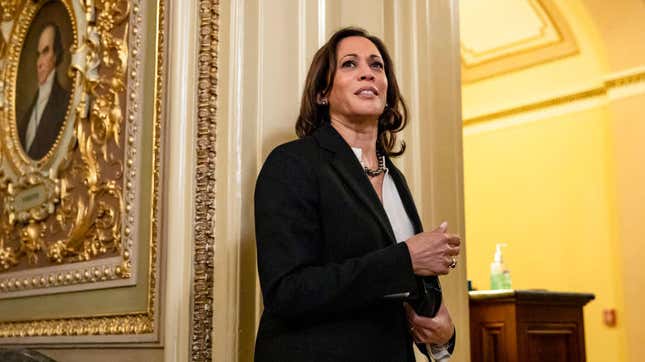
Joined by Senators Bernie Sanders and Ed Markey, Kamala Harris is pushing new legislation that would provide up to $2,000 a month for every U.S. resident. There’s another term for that: a universal basic income.
While UBIs are usually associated with the magical thinking that we’ll at some point reach a fully-automated post-work economy, the closest America came to instituting one was arguably through vast expansions of unemployment benefits during the Great Depression. We’re certainly headed for similar territory now, with a current unemployment rate of nearly 15 percent, and an estimated 20,500,000 jobs lost so far.
The proposal builds on an idea Harris has been kicking around for some years, but which was previously a more modest tax credit of up to $500. This new bill—and we can hypothesize if these unusual times or the input of considerably more left-leaning Senators Sanders and Markey was a deciding factor—calls for direct cash payments of $2,000 per individual and $2,000 per child, and would apply retroactively to the months of March and April. This could be a lifesaving infusion for many Americans who are out of work, especially as no major city has yet instituted any form of rent cancellation.
To be clear, what Harris proposes isn’t a UBI exactly, as it’s not intended to be universal. Those with an income of $100,000 would see decreased payments, while anyone making $120,000 or more would be ineligible to receive the stimulus.
Is it even worth contrasting a proposal to consistently float struggling Americans through this pandemic with an unserious, one-time, $1,200 payment approved by the Trump administration, which some people still have not received? No, it most definitely is not—especially since the White House has announced it wouldn’t consider additional stimulus for the rest of the month. Unlike that ridiculous PR scheme, this bill would make funds available, even to those without social security numbers, and also stipulates that the monthly payments cannot be garnished by debt collectors.
All that said, Republicans—led by a majority leader who thought allowing states to propose bankruptcy was a smart idea—control the Senate currently, and are unlikely to vote favorably on any social welfare program. If and when this bill dies on the Senate floor, you’ll know who to blame.